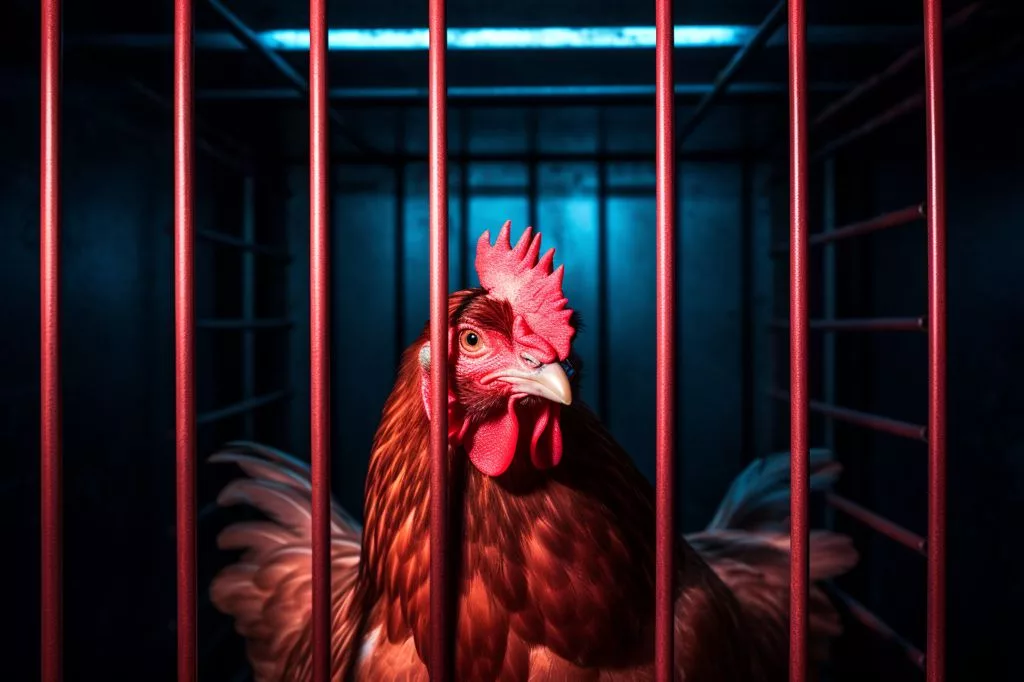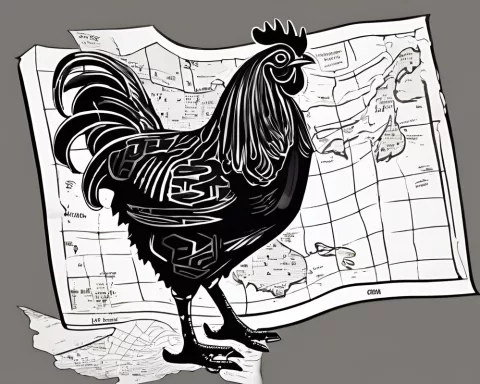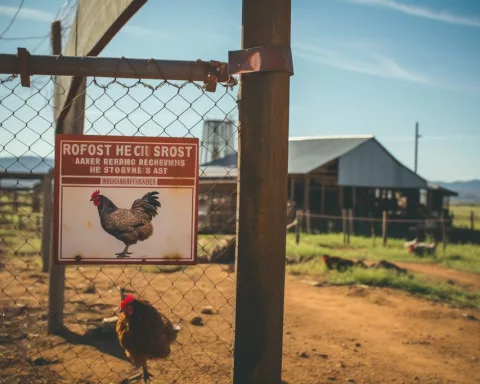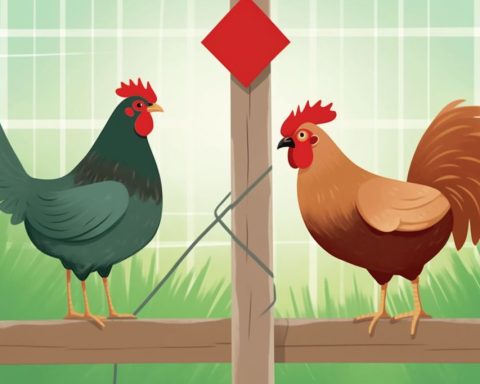South Africa’s avian influenza crisis is exposing the vulnerability of the poultry industry, highlighting the need for transformative changes in food production systems. The crisis has resulted in the culling of 7.5 million chickens, emphasizing the risks posed by the mass production of confined animals. Experts call for a fundamental shift towards a diversified, resilient, and humane food system that is free from animal exploitation, encouraging the transition to a more plant-based food system. This change would benefit not only animal welfare but also the long-term sustainability and resilience of our food systems.
What does South Africa’s avian influenza crisis reveal about the vulnerability of the poultry industry?
South Africa’s ongoing battle against avian influenza highlights the vulnerability of the country’s poultry sector and emphasizes the urgent need for transformative changes in food production systems. The crisis has resulted in the culling of 7.5 million chickens, including 2.5 million meat chickens and five million egg-laying hens. The food system’s dependence on mass production of confined animals is intrinsically risky, requiring a fundamental shift towards a diversified, resilient, and humane food system that is free from animal exploitation.
Unprecedented Outbreaks and Impact on the Poultry Industry
South Africa’s ongoing battle against avian influenza exposes the vulnerability of the country’s poultry sector and underscores the need for a transformative overhaul of food production systems. Since September, the nation has faced an alarming 50 outbreaks of the H7 strain and 10 of the H5 strain, causing the chicken and egg industries to cull 7.5 million chickens, including 2.5 million meat chickens and five million egg-laying hens. This figure represents a distressing 20-30% of South Africa’s total flock.
In 2017, an outbreak of H5N8 resulted in the culling of 20% of the national flock, costing the poultry sector R1.8 billion and leading to over 1,300 job losses. The current crisis has caused egg shortages, further unemployment, and rising egg prices, emphasizing the need to progress beyond vaccinations and biosecurity strategies to tackle the ongoing emergence and evolution of new avian influenza strains.
Candice Blom, a farmed animal expert for HSI/Africa, argues that the food system’s vulnerability becomes apparent when millions of chickens are culled to control disease outbreaks. She suggests that a food system dependent on the mass production of confined animals is intrinsically risky, despite biosecurity measures and imported vaccines. Blom calls for a fundamental shift towards a diversified food system that is resilient, humane, and free from animal exploitation.
The Need for Ethical Practices and a Plant-Based Food System
One crucial aspect to address is the cruel confinement of hens during egg production. A significant majority of egg-laying hens in South Africa endure inhumane and intensive battery cage systems. In these tight cages, each hen is allocated an area no larger than an A4 sheet of paper, prohibiting them from engaging in natural behaviors such as nesting, perching, dustbathing, scratching, foraging, and even basic activities like walking or flapping their wings.
The avian flu crisis in South Africa acts as a wake-up call, encouraging the reevaluation of animal and food production practices and the transition to a more plant-based food system. This change would benefit not only the animals involved but also the long-term sustainability and resilience of our food systems. Adopting a more compassionate, eco-friendly, and diverse food system would help alleviate the risks posed by disease outbreaks, decrease animal suffering, and create a more sustainable future for all living beings.
Embracing Innovation and Alternative Food Sources
As South Africa confronts the ramifications of the avian flu outbreak, it is essential to view it as a chance to tackle the systemic issues afflicting the poultry sector. By reassessing and transforming food production practices, a more robust, diverse, and compassionate food system can be developed. This new system would not only diminish animal suffering but also contribute to a more sustainable and secure food supply for the nation.
During this critical time, industry leaders, policymakers, and consumers must unite to promote a more ethical and sustainable food system. By adopting innovative approaches and alternative food sources, a future where both animals and humans can coexist without compromising each other’s well-being can be achieved.
Furthermore, transitioning to a more plant-based food system would yield significant benefits for the environment, human health, and social equity. By reducing reliance on animal agriculture, contributions can be made towards climate change mitigation, natural resource conservation, and the reduction of chronic diseases associated with the consumption of animal products.
In conclusion, South Africa’s avian influenza outbreak serves as a stark reminder of the vulnerability of our current food system. It is high time we heed this warning and embark on a journey towards a more diverse, resilient, and compassionate food system that benefits all living beings.
1. What is South Africa’s avian influenza crisis exposing about the poultry industry?
The crisis is exposing the vulnerability of the poultry industry, highlighting the need for transformative changes in food production systems. The mass production of confined animals poses a significant risk, emphasizing the need for a fundamental shift towards a diversified, resilient, and humane food system that is free from animal exploitation.
2. How many chickens have been culled due to the avian influenza outbreaks?
7.5 million chickens, including 2.5 million meat chickens and five million egg-laying hens, have been culled due to the avian influenza outbreaks.
3. What are the impacts of the avian influenza crisis on South Africa’s poultry industry?
The crisis has caused egg shortages, further unemployment, and rising egg prices, emphasizing the need to progress beyond vaccinations and biosecurity strategies to tackle the ongoing emergence and evolution of new avian influenza strains.
4. What is the need for ethical practices and a plant-based food system?
A significant majority of egg-laying hens in South Africa endure inhumane and intensive battery cage systems, highlighting the need for ethical practices. The crisis serves as a wake-up call, encouraging the transition to a more plant-based food system that benefits not only the animals involved but also the long-term sustainability and resilience of our food systems.
5. How can South Africa embrace innovation and alternative food sources?
By reassessing and transforming food production practices, a more robust, diverse, and compassionate food system can be developed. Industry leaders, policymakers, and consumers must unite to promote a more ethical and sustainable food system, adopting innovative approaches and alternative food sources.
6. How would a transition to a more plant-based food system benefit the environment and society?
Transitioning to a more plant-based food system would yield significant benefits for the environment, human health, and social equity. Contributions can be made towards climate change mitigation, natural resource conservation, and the reduction of chronic diseases associated with the consumption of animal products.
7. What is the role of policymakers, industry leaders, and consumers in promoting a more sustainable and ethical food system?
During this critical time, policymakers, industry leaders, and consumers must unite to promote a more ethical and sustainable food system, adopting innovative approaches and alternative food sources.
8. What would be the long-term benefits of a more diverse, resilient, and compassionate food system?
A more diverse, resilient, and compassionate food system would benefit all living beings, including animals, the environment, and humans. It would alleviate the risks posed by disease outbreaks, decrease animal suffering, and contribute to a more sustainable future.











